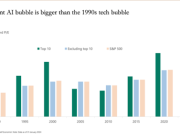The right stocks can make you rich and change your life.
The wrong stocks, though… They can do a whole lot more than just “underperform.” If only! They can eviscerate your wealth, bleeding out your hard-won profits.
They’re pure portfolio poison.
Surprisingly, not many investors want to talk about this. You certainly don’t hear about the danger in the mainstream media – until it’s too late.
That’s not to suggest they’re obscure companies – some of the “toxic stocks” I’m going to name for you are in fact regularly in the headlines for other reasons, often in glowing terms.
I’m going to run down the list and give you the chance to learn the names of three companies I think everyone should own instead.
But first, if you own any or all of these “toxic stocks,” sell them today…
Etsy (NASDAQ: ETSY)
Etsy (NASDAQ: ETSY) has been struggling with slowing revenue growth, a trend that’s becoming more evident across the e-commerce sector. In its most recent earnings report, Etsy posted another quarter of declining year-over-year gross merchandise sales (GMS), down 2.1% YOY. While revenue managed a modest 3.0% YOY increase, this growth was driven primarily by higher fees and advertising, not from expanding its core business. Net income took a hit, dropping 14% YOY, underscoring the challenges Etsy faces as its pandemic-driven growth continues to fade.
Despite hopes for a rebound, Etsy’s stock has been in a downward spiral, falling 32% year-to-date and more than 80% from its peak. The reality is that Etsy’s growth story may be over, and the market seems to be reflecting that sentiment. With revenue growth now dependent on price hikes rather than increased sales volume, the long-term outlook appears bleak.
Given these factors, it may be time to reconsider holding onto Etsy. The stock’s current trajectory suggests that further declines could be on the horizon, especially if revenue begins to decline YOY, as we’ve already seen with GMS. Selling now could be a prudent move to avoid deeper losses as the company continues to navigate a challenging environment.
Northrop Grumman (NYSE: NOC)
Defense stocks have been on a remarkable run recently, largely fueled by the volatile geopolitical landscape. Northrop Grumman (NYSE: NOC) has benefited from this surge, with the stock up 16% over the past month alone. The company has delivered strong results, including a 7% year-over-year increase in revenue to $10.2 billion and a 19% jump in earnings per share to $6.36. Their impressive performance is further highlighted by a record order backlog of $83.1 billion, including $38.4 billion in funded contracts.
However, despite these solid fundamentals, Northrop’s stock now trades at a rich valuation, roughly 20 times earnings. While this premium valuation reflects the company’s strong position in the defense sector, it also suggests that much of the news may already be priced in. Given the rapid ascent in its stock price and the current valuation, the downside risk is growing, especially if the geopolitical environment stabilizes or if defense budgets don’t expand as expected.
For investors, this could mean that the risk of holding Northrop Grumman is starting to outweigh the potential rewards. With the stock now vulnerable to a re-evaluation, particularly if there’s any shift in market sentiment or defense spending forecasts, it may be prudent to consider selling before any potential downside materializes.
In short, while Northrop Grumman remains a strong company fundamentally, the current market conditions and its elevated stock price suggest that taking profits now could be a wise move.
iRobot (NASDAQ: IRBT)
As robotics continues to capture investor attention, driven by advances in artificial intelligence and automation, it’s crucial to remain discerning about where to place your bets. While the sector holds promise, not all players are well-positioned to capitalize on the opportunities ahead.
iRobot (NASDAQ: IRBT), known for its popular Roomba vacuum, has been struggling to maintain its footing in a rapidly evolving market. The company has seen its stock price plummet by nearly 81% this year, largely due to inflationary pressures and rising interest rates, which have dampened consumer spending on non-essential tech products. The pandemic-driven surge in consumer tech purchases has also left iRobot with a challenging environment to navigate.
In an attempt to stabilize, iRobot introduced the “iRobot Elevate” restructuring plan earlier this year, aimed at cutting operational costs and reducing inventory levels. While these efforts have led to some improvement in margins, they may not be enough to spark a meaningful recovery.
Adding to iRobot’s woes is the growing competition from emerging Chinese companies like Narwal, which are backed by tech giants such as Tencent and ByteDance. Narwal’s innovative products, like self-cleaning mops, are gaining traction and pose a direct challenge to iRobot in the premium market segment.
Given the intense competition, ongoing operational challenges, and a shifting market landscape, it may be time to consider selling iRobot before its situation potentially worsens. The company’s path to recovery appears steep, and the risks seem to outweigh the potential rewards at this point.











